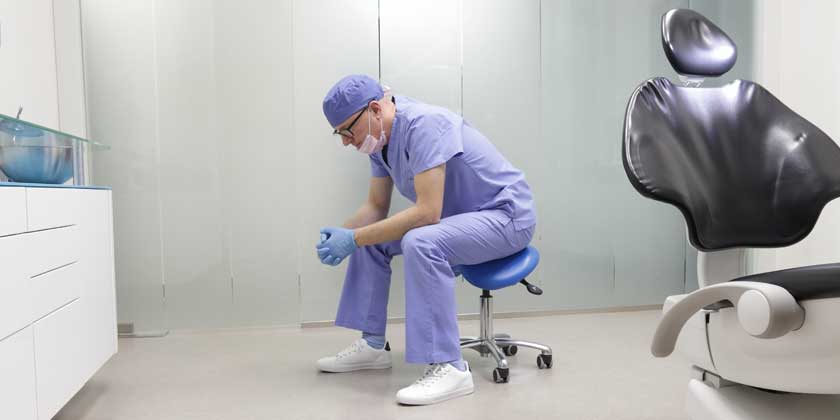We’ve all had days in the clinic where stress has become overwhelming.
Maybe you’re dealing with an anxious patient, or attempting a new procedure for the first time.
Maybe you’ve just been so ridiculously busy that you haven’t even had a chance to grab a morning coffee (disastrous, I know).
Don’t get me wrong, having some stress in your life can actually be quite handy.
It forces you to concentrate more in intense situations.
It's also a great motivator for getting things done that you don’t particularly feel like doing.
Which is why students approaching a deadline are some of the most productive people in the world.
The thing is, dentists, encounter way too much stress on a daily basis.
In fact, a study of over 2,000 British dentists revealed that 54.9% experienced high job stress.
And be honest, it’s pretty easy to see why.
You’re dealing with people who are often anxious or stressed about sitting in the chair. You’re constantly running out of time and juggling the struggles of running a practice. You’ve got to be there for everyone in your practice without anyone being there for you. You feel like you barely get any time to yourself because you’re constantly thinking about work. You can’t just disappear on vacation when you want because you’ve got to run the practice and make money. There’s an incredibly high risk of being sued if you mess up even slightly.
I’m not going to lie, just typing out that paragraph increased my stress levels by about 504%.
And that’s just the tip of the iceberg!
Imagine if you had to deal with stress in your personal life as well as your professional life.
So to help you out, next time you come home from the clinic and feel like collapsing in a ball on the sofa, try doing some of these things instead.
In and out, in and out…
Breathing exercises are an undeniably effective way of handling stress.
When you breathe deeply, your brain sends a message to your body that it’s time to calm down.
Deep breathing exercises help combat high blood pressure, fast breathing and increased heart rate - basically all the negative physical side effects of stress.
The thing with breathing exercises is you’ve got to find one that works for you.
Different people have different preferences and it can take a little bit of time before you land on one that you’re comfortable with.
My go-to is the 4-7-8 breathing exercise. If you start doing it twice a day, you’ll see the benefits really quickly.
Here’s how you do it:
- empty your lungs of air
- breathe in through your nose for 4 seconds
- hold your breath for 7 seconds
- exhale forcefully through the mouth, pursing the lips and making a “whoosh” sound, for 8 seconds
- repeat the cycle up to 4 times
Asleep in 60 seconds: 4-7-8 breathing technique claims to help you nod off in just a minute
There are many different breathing exercises you can explore. Here’s a fairly comprehensive list.
Let’s get physical!
It’s fairly well known that exercising is a great way to manage stress and help you feel better.
It improves your mood, releases much-needed endorphins and gives you an opportunity to switch your brain off and ignore whatever rubbish things happened during the day.
There’s just one problem.
After you’ve had a stressful day in the clinic, sometimes it seems nearly impossible to drag yourself out of the house and head to the gym to get a workout in.
You’re physically exhausted and emotionally drained.
However, it’s important to remember that exercise doesn’t have to result in you chucking on the sweatbands while some overly-enthusiastic personal trainer screams “JUST ONE MORE” in your face.
Try going for a walk in nature, or playing a sport you enjoy.
You can even try meditating to reduce stress or schedule a brief 15-minute walk during the middle of the workday.
Exercise is important, but it’s even more important that you actually enjoy doing it.
Treat yourself
There’s a famous scene in the TV show Parks and Rec where two of the characters express how enjoyable it is to set aside a day where you just do whatever you want, and treat yourself.
Now, I’m not suggesting that you need to schedule a daily massage or spend obscene amounts of money on things you can’t afford...
But the reality is that getting to treat yourself after a stressful week at work genuinely does help.
It’s proven that indulging in life’s little pleasures has a tangible impact on your overall health and wellbeing.
Whether it’s watching a funny movie or treating yourself to your favourite takeaway, you’ll notice a massive difference if you set time aside each week to do the things you love.
Chat with your family or friends
You know that old saying “a problem shared is a problem halved”? Well, it’s absolutely true.
Talking to people about how you’re feeling, whether that's friends, family or even a therapist goes a long way in reducing your stress levels.
Recent studies have actually discovered that just talking about our problems and negative emotions with someone else helps our mental health.
It massively helps reduce stress, strengthens our immune system and reduces physical and emotional stress.
Sure, it can be daunting to open yourself up and be vulnerable, but it’s something that will be hugely beneficial for you going forward.
As they say, the best things in life aren’t easy.
Being vulnerable and open about your emotions is certainly one of them.
Separate your work from your personal life
One of the tricky things with dentistry is that a lot of dentists actually internalise the anxiety that their patients feel.
You work in a profession where the majority of people you deal with are immensely afraid of going to the dentist.
In fact, it’s estimated that about 569,400,000 million people suffer from dentophobia.
There’s now considerable evidence that suggests that dentists experience physiological patterns of stress such as increased heart rate, high blood pressure, sweating when they deal with an anxious or stressed patient.
If you were to see multiple anxious patients in one day, then you’d probably come home feeling like you were going to explode.
It’s really important that as a dentist, you’re conscious of not internalising other people’s anxiety and stress.
However, that’s much easier said than done.
We have a series of free tips and tricks where Dr Lincoln Harris talks about how to deal with anxious patients.
It’s a fantastic watch and it’s totally free. Grab it here.





